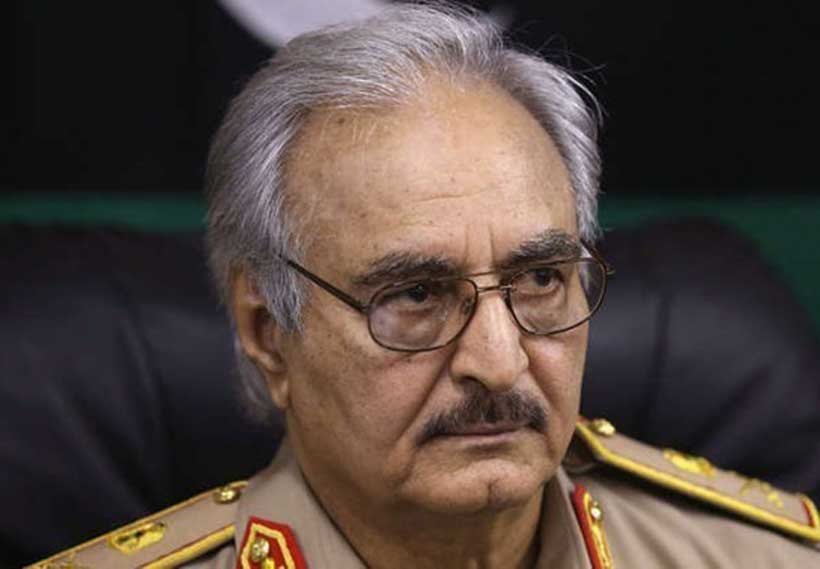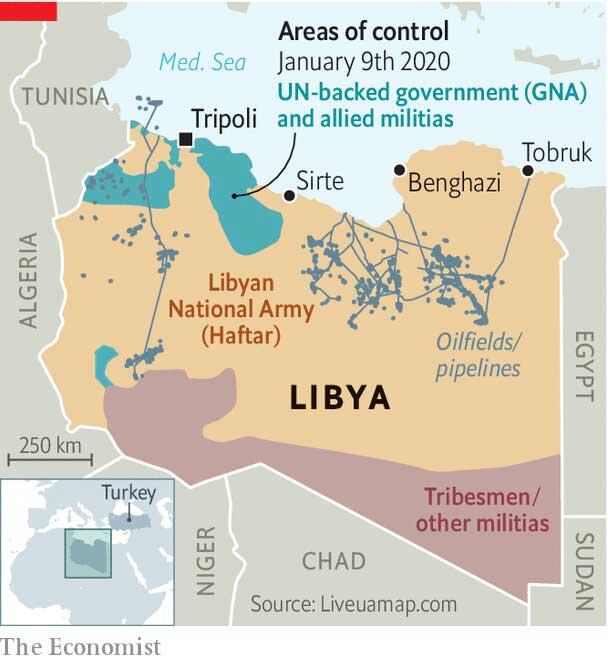
Prospects of normalization grim in Libya
by Salman ParvizAnalysts say that Libya is one of the most important crisis to watch for in 2020 because of the involvement of Russia and Turkey. More importantly, the plight of the Libyans after almost 10 years of civil war cannot be ignored.
Jens Stoltenberg, head of NATO military alliance recently said in an interview that Turkey remains an important ally and NATO is ready to support GNA increasing the possibility of Russia and NATO locking horns.
Eight years after Libyan leader Colonel Muammar Gaddafi eliminated his country’s weapons of mass destruction the colonel found himself on the wrong side of the gun, when he was overthrown and killed in 2011 submerging the country in a civil war.
NATO members led by Britain and France supported the so-called revolution by airstrikes – then watched as the country sank into chaos. Barrack Obama said leaving Libya without a plan after Gaddafi was the “biggest mistake” of his presidency.
There are fears that the global Covid-19 pandemic could devastate the war-torn Libya, where a decade long conflict has ravaged key infrastructure and created dire medical shortages.
Today the country is divided into two factions backed by foreign powers struggling to put the country together.
On the one side, there is the UN-recognized Government of National Accord (GNA) under Prime Minister Fayez Mustafa al-Sarraj in Tripoli supported by Turkey, Qatar, and Italy. Turkey has deployed Syrian mercenaries.
Tripoli has been under siege by Libyan National Army (LNA) headed by Khalifa Haftar, who started his offensive on Tripoli in April 2019. The offensive was launched while UN Secretary-General Antonio Guterres arrived in Tripoli to prepare for a peace conference.

Unsuccessful in taking Tripoli, Haftar has laid a siege on the capital city for the last four months.
The 76-year-old Libyan-born commander Haftar is supported by Russia, Egypt, France, Jordan, the United Arab Emirates, and to a lesser extent Israel. Russia has sent mercenaries.
The Wall Street reported that prior to his April offensive on Tripoli, Haftar was in Riyadh where Saudis gave him tens of millions of dollars.
In his dominion, Haftar is known as “the marshal”, and is the military ruler of eastern Libya, with Benghazi as his stronghold. He has promised to build a stable, democratic, and secular Libya but the regions in his control are without any law and order and corruption abounds.
There were several summits by international community to put an end to the Libyan strife before Covid-19 pandemic sidelined the Libyan crisis.
The last summit was called the Berlin Conference was held on January 19. Haftar and al-Sarraj didn’t even meet face to face and the summit failed to yield results.
China has remained neutral in this conflict. Under the Gaddafi regime, China engaged in various infrastructure activities with 35,000 Chinese laborers working across 50 projects, ranging from residential and railway construction to telecommunications and hydropower ventures. The year leading to Gaddafi’s overthrow, Libya was providing three percent of China’s crude oil supply, constituting roughly 150,000 barrels a day. All of China’s top state oil firms – CNPC, Sinopec Group, and CNOOC – had had standing infrastructure projects in Libya.
In the outbreak of protests in 2011, China sought to preserve economic ties with Libya and rejected the NATO-led military intervention. China abstained at the UN Security Council vote to authorize military intervention.
In late 2015, the GNA emerged as the new political authority, the product of negotiations brokered by the United Nations and backed by China.
Although many Chinese projects were suspended in Libya and bilateral trade decreased by 57 percent, China’s neutrality paved the way for Beijing to stand in good stead with GNA for years to come.
Immigrants crisis
Home to an estimated 654,000 migrants – more than 48,000 of them registered asylum seekers or refugees – many of them cramped conditions with little access to healthcare amidst the pandemic. An outbreak can be catastrophic.
Many live on transfers from friends and family and UNHCR handouts. With work hard to find many hope to proceed with their journey to Europe. Smugglers have put hundreds and thousands of them in boats and sent them across the Mediterranean to Italy.
UNHCR has been evacuating some of the most vulnerable refugees until airspace was shut in early April.
On May 13, WHO issued a joint statement on Libya emphasizing that the entire population of the country, especially some 400,000 Libyans that have been displaced – about half of them within the past year, since the attack on Tripoli — are at risk of Covid-19 pandemic.
The statement reported everyday challenges that humanitarian missions and workers face to carry on with their mission. The UN verified 113 cases of grave violations, including killing and maiming of children, attacks on schools, and health facilities.
The report points out that as of May 13, there were 64 confirmed cases of Covid-19, including three deaths, in different parts of the country. This shows transmission of the disease is taking place and the risk of further escalation of outbreak is very high.
The report talks about food security and latest assessments show that most cities are facing shortages of basic food items coupled with an increase in prices, urging all parties to protect the water supply facilities that have been deliberately targeted.
“We look forward with anticipation to the pledged financial support to the Humanitarian Response Plan for Libya, as announced by the GNA,” WHO statement said.
Oil production
Oil reserves in Libya are the largest in Africa with 46.4 billion barrels as of 2010. Much of Libya’s oil wealth is located in the east but the revenues are channeled through Tripoli-based state oil firm National Oil Corporation (NOC), which says it serves the whole country and stays out of its factional conflicts.
Prior to the 2011 Libyan civil war, Libya produced over 1.5 million barrels a day. As a result of a blockade of export terminals by LNA by February of this year oil production dropped to 200,000 barrels a day reports Bloomberg. NOC said the North African state’s current level of production is at 91,221 barrels per day as of March 17.
In order to choke GNA from the crucial crude export revenue, the LNA seized Libya’s export terminals and ports in the east in mid-January. The blockade has cost Libya some $560 million, Petroleum Economist reported in January.
According to NOC, the blockade has plunged production from around 1.2 million barrels a day, and added losses had surpassed four billion dollars by April 15.
Conflict wages
In the last couple of weeks, significant developments have been happening in the Libyan civil war.
In an interview with Italian daily La Repubblica, Jens Stoltenberg, head of NATO military alliance said that Turkey remains an important ally and NATO is ready to support GNA. He stressed NATO is supporting UN’s efforts for a peaceful solutions to conflicts both in Libya and Syria.
Meanwhile, the independent English language Tripoli-based Libyan Express reported that Haftar launched a rocket attack Thursday on Tripoli, hitting the Central Hospital on other downtown areas.
Tripoli Central Hospital and some civilian areas were targeted. GNA’s Health Ministry said 14 civilians were injured, adding that the hospital will not be able to serve people due to the attack pointing out what a massive setback was amid the outbreak of Coronavirus.
Libyan military forces said Monday that the Libyan army struck forces loyal to Haftar in Al-Watiya airbase in the southwest of Tripoli during the government-led Operation Volcano of Rage.
LNA has intensified attacks on civilians since the beginning of May as GNA made substantial military progress in the offensive in the western part of Tripoli. Armed drones provided by Turkey conducted effective attacks against the LNA.
Libyan Interior Minister Fathi Bashaghe has accused Haftar’s forces had used chemical weapons on the Salah Al-Deen front, south of Tripoli. The accusations were confirmed by Canadian journalist Amru Saleheddine, who found several government soldiers with symptoms to those of epilepsy, usually caused by nerve gas.
The conflict in Libya is backed by foreign actors with different objectives and priorities. Any emerging power configuration will be fragile unless the external actors come to a shared understanding.
From our partner Tehran Times